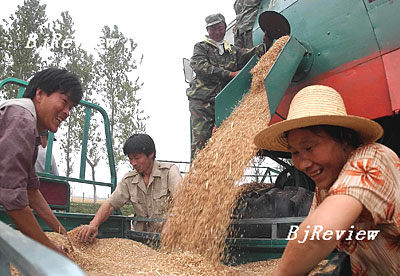|

At the start of the new year, it is customary for media reports to review and forecast what has gone before and what lies ahead. China, thanks to its expanding global influence, is a hot topic to latch on to, most notably in Western media. Huang Qing, desk editor with People's Daily, one of the most influential daily newspapers in China, examines this process in an editorial. Excerpts follow:
An article entitled "The Rise of China and the Future of the West," written by G. John Ikenberry from the January/February issue of the U.S. Foreign Affairs journal, notes that "the rise of China will undoubtedly be one of the great dramas of the 21st century," and "China's extraordinary economic growth and active diplomacy are already transforming East Asia."
The United States' "unipolar moment" will inevitably end, as the Western-oriented world order is replaced by one increasingly dominated by the East, the article acknowledges. It adds, "But the U.S.-led international order can remain dominant even while integrating a more powerful China."
There are also many other notions such as that implying that China is a fragile superpower because of the serious rich-poor divide in the country.
China-related observations in Western media this year are indeed varied, while those that are unreasonable and laden with moral pretension are less prevalent. In the meantime, among the opinions that recognize the fact that China is developing, positive and negative judgments conflict with each other, sometimes fiercely.
No matter what they say, we Chinese should neither be cocky because of high appraisals, nor feel inferior with given underestimates. A consensus should be built in the nation, creators of the country's new wealth and sufferers of its shortcomings, that only a down-to-earth manner could help China make fresh progress.
Though the value and price of a given commodity is never identical in the sense of economics, the price will ultimately comply with its real value and fluctuate around it. As for a nation, its genuine intrinsic value lies precisely in the quality of its nationals, formation of a sound social structure, the in-built vitality of its economy and a suitable development strategy. The Chinese should strive for the improvement in these four fields, instead of paying only overdue attention to assessments given by the outside world.
Due to the sharp appreciation of the Japanese yen, prices of almost all yen-denominated assets rocketed in the mid-1980s, when the book value of real estates in Tokyo alone exceeded that of all properties on U.S. mainland. After the property and financial bubbles burst, however, the Japanese economy turned strained and languid for 18 straight years. There were financial disasters of this kind occurring in other parts of Asia then. So the Chinese should be sober-minded with similar pressure or situations around at present, and we should have a sense of crisis and be ready to cope with any possible, similar misfortunes and unexpected incidents.
Three full decades ago, China started to pursue the national policy of reform and opening up to the outside world. This epitomizes its commitment to take an active part in international affairs in ensuing years. In the process to honor this commitment, China has all along persevered in "not seeking hegemony," whereas "a harmonious world" stands for its aspiration vista for this global setup.
With respect to irrational international orders, China should resort to the "step-in" method in pushing forward reforms and conducting consultations with other countries on an equal footing for this purpose, so as to better accord these orders to the shared interests of humankind and make them much fairer. | 